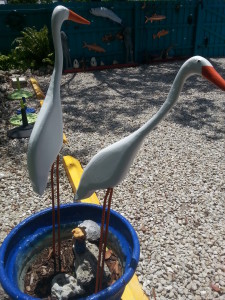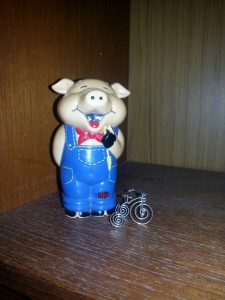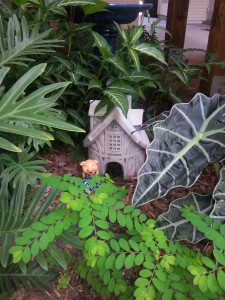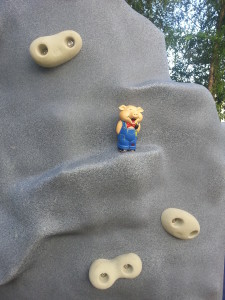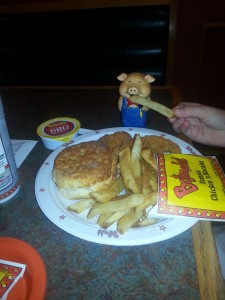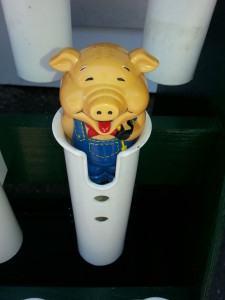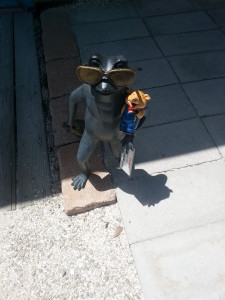
Me: Who is your friend Prodigal?
Prodigal: This is my friend froggy who is blind.
Me: Wow, He does not seem frustrated with his blindness.
Prodigal: No, he has peace with it and actually brings me many blessings with his friendship.
Me: I have a story about a blind man who changed the perspective of another.
Prodigal: My friend wants to hear this also!
Max Lucado shares a personal story from his heart.
I had just spend a portion of the morning preparing a lesson out of the ninth chapter of John, the chapter that contains the story about the man blind from birth. I’d finished lunch and was returning to my office when I saw him. He was singing. An aluminum cane was in his left hand; his right hand was extended and open, awaiting donations. He was blind.
After walking past him about five steps, I stopped and mumbled something to myself about the epitome of hypocrisy and went back in his direction. I put some change in his hand. “Thank you,” he said and then offered me a common Brazilian translation, “and may you have health.” Ironic wish.
Once again I started on my way. Once again the morning’s study of John 9 stopped me. “Jesus saw a man, blind from birth.” I paused and pondered. If Jesus were here he would see this man. I wasn’t sure what that meant. But I was sure I hadn’t done it. So I turned around again.
As if the giving of a donation entitled me to do so, I stopped beside a nearby car and observed. I challenged myself to see him. I would stay here until I saw more than a sightless indigent on a busy thoroughfare in downtown Rio de Janeiro.
I watched him sing. Some beggars grovel in a corner cultivating pity. But this man did none of that. He stood. He stood tall. And he sang. Loudly. Even proudly. All of us had more reason to sing than he, but he was the one singing.
The passersby had various reactions. Some were curious and gazed unabashedly. Others were uncomfortable. They were quick to duck their heads or walk in a wider circle. “No reminders of harness today, please.” Most, however, hardly noticed him. Their thoughts were occupied, their agendas were full and he was…well, he was a blind beggar.
I was thankful he couldn’t see the way they looked at him.
After a few minutes, I went up to him again. “Have you had any lunch?” I asked. He stopped singing. He turned his head toward the sound of my voice and directed his face somewhere past my ear. His eye sockets were empty. He said he was hungry. I went to a nearby restaurant and bought him a sand which and something cold to drink.
When I came back he was still singing and his hands were still empty. He was grateful for the food. We sat down on a nearby bench. Between bites he told me about himself. Twenty-eight years old. Single. Living with his parents and seven brothers. “Were you born blind?”
“No, when I was young I had an accident.” He didn’t volunteer any details and I didn’t have the gall to request them.
Though we were almost the same age, we were light-years apart. I wore a shirt and tie and some new shoes. His shoes had holes and his coat was oversized and bulky. His pants gaped open from a rip in the knee.
And still he sang. Though a sightless, penniless hobo, he still found a song and sang it courageously. (I wondered which room in his heart that song came from.)
I decided the motivation that fit his demeanor was the one you would least expect. He was singing from contentment. Somehow this eyeless pauper had discovered a candle called satisfaction and it glowed in his dark world.
The irony was painfully amusing. This blind man could be the most peaceful fellow on the street. No diploma, no awards, and no future–at least in the aggressive sense of the word. But I wondered how many in that urban stampede would trade their boardrooms and blue suits in a second for a chance to drink at this young man’s well.
“Faith is the bird that sings while it is yet dark.”
For almost a block, I could hear him singing. And in my mind’s eye I could still see him. But the man I now saw was a different one than the one to whom I’d given a few coins. Though the man I now saw was still sightless, he was remarkable insightful. And though I was the one with eyes, it was he who gave me a new vision.
Do you need a new vision? Maybe not for a blind beggar but for that person who you look down on. How would they look through the eyes of God?
John 9:3
Jesus answered, Neither hath this man sinned, nor his parents: but that the works of God should be manifest in him.
Jennifer Van Allen
www.theprodigalpig.com
www.faithincounseling.org
